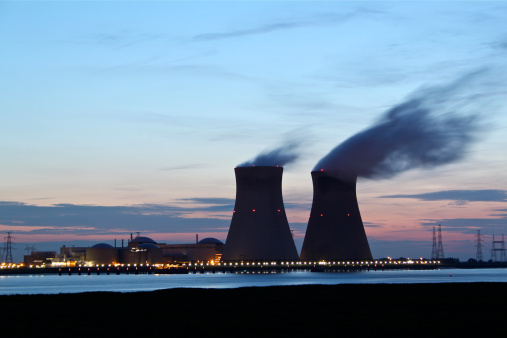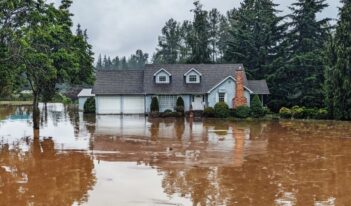
Debate reignites over whether nuclear energy is an important tool or a costly mistake.
Should nuclear energy development be part of a global strategy to reduce climate change? Many people agree that emissions of greenhouse gases must be reduced to curb the disastrous effects of climate change. Although widespread support exists for the development of low greenhouse gas-emitting alternatives to coal, oil, and gas, investment in nuclear power remains contentious.
Supporters of nuclear energy think its benefits outweigh the risks. Some prominent climate scientists maintain that climate goals cannot be achieved without investment in nuclear energy. And even some environmentalists who previously opposed nuclear energy now consider it an essential component of climate policy.
Recently, two former administrators of the U.S. Environmental Protection Agency (EPA) voiced support for inclusion of nuclear energy in climate change policies. Carol Browner, the EPA administrator during the Clinton Administration, said she reexamined her position because of the dangers of climate change and now supports nuclear energy. Browner joined the leadership of Nuclear Matters, a pro-nuclear advocacy organization, earlier this year.
Christine Todd Whitman, an EPA administrator from the second Bush Administration, co-chairs the Clean and Safe Energy Coalition, which advocates for nuclear power. Whitman stated recently that “neglecting clean energy sources such as solar, wind, and especially nuclear, can result in blackouts, increased power bills, and will take a heavy toll on our efforts to reduce greenhouse gases.”
Proponents of nuclear energy point to how its use has already slowed climate change, and they argue that production of more nuclear power will effectively combat rising greenhouse gas emissions. Supporters of nuclear power believe that investing only in renewable power sources will not satisfy energy demands.
Opponents are unconvinced. Organizations such as Greenpeace and the Nuclear Information and Resource Service have been fighting nuclear power for decades and see no merit to the climate change argument. Advocates against nuclear power argue that nuclear energy poses unacceptable threats to environmental and human health and that investing in more reactors will be too costly. Anti-nuclear activists say efforts to reduce climate change should focus on developing renewable energy instead.
Nuclear power’s opponents often cite meltdowns and other near disasters to demonstrate the dangers of this energy source. Although scientists hold differing views about the extent of radiation and health effects from the Fukushima disaster, for example, one thing that seems certain is that the cost of cleanup will be high. Dealing with the Fukushima disaster is estimated to cost hundreds of billions of dollars. And Chernobyl’s cleanup, nearly thirty years after the accident, is still ongoing. Chernobyl’s total economic costs have been predicted to be over $200 billion; the newest containment measure there is alone budgeted at about $1.5 billion.
Opponents also point to the unsolved issue of disposal of nuclear waste, the radiation from which can reportedly remain hazardous for 240,000 years. No permanent disposal facility for nuclear waste currently exists in the United States.
Recently, several environmental groups sought review of a U.S. Nuclear Regulatory Commission (NRC) rule that, the groups say, allows for long-term storage of waste at decommissioned nuclear plants. These environmental groups argue that the NRC should stop issuing licenses to nuclear plants because no safe disposal method currently exists. Connecticut, New York, and Vermont are also challenging the NRC rule.
Proponents of nuclear energy believe that producing it is becoming safer, and the effects from accidents and problems with disposal are minor compared to the potentially catastrophic effects of climate change. Former U.S. Department of Energy (DOE) Deputy Secretary Daniel Poneman, although acknowledging that climate change and nuclear energy are both large threats, reportedly sees nuclear energy as having “a role to play in our low carbon future.” Climate scientist James Hansen says that stronger safety measures and innovations in technology can help assuage environmental and health concerns.
Government agencies, including the DOE, support investment in nuclear energy to reduce greenhouse gas emissions. Earlier this year, the DOE issued around $6.5 billion in loan guarantees to assist in building new reactors. And in September, the DOE announced a draft loan guarantee solicitation of $12.6 billion for nuclear energy projects.
Currently, nuclear power accounts for about 19% of energy produced in the United States and about 11% worldwide. Globally, about seventy new nuclear plants are currently under construction. The first commercial nuclear reactor to be licensed in the United States since 1996 is scheduled to come online at the end of next year. Four more reactors are currently being built in the United States, after a nearly thirty-year lapse in construction of commercial nuclear plants.
Yet the construction of most of these nuclear reactors remains behind schedule and over budget, and plans for other new reactors have been abandoned. As a result, nuclear power’s opponents do not see much future for it in the United States. Some even dispute the claim that new construction of nuclear power plants would reduce greenhouse gas emissions.
According to a 2012 study, the American public is undecided on whether nuclear power should be increased. Some environmentalists do not have firm convictions either way. Bill McKibben, founder of the climate action group 350.org, says nuclear power is “probably an unrealistic alternative” and too expensive, but he is not opposed to considering it.
While Germany is phasing out nuclear power, some countries, including the United States, are investing in research to increase the efficiency and safety of nuclear reactors. New technologies are also emerging that may allow nuclear facilities to produce less waste. Although these innovations seem promising, many are years or decades away from being implemented. The debate over whether nuclear power’s benefits outweigh its risks will likely continue as policymakers consider options to mitigate climate change.



